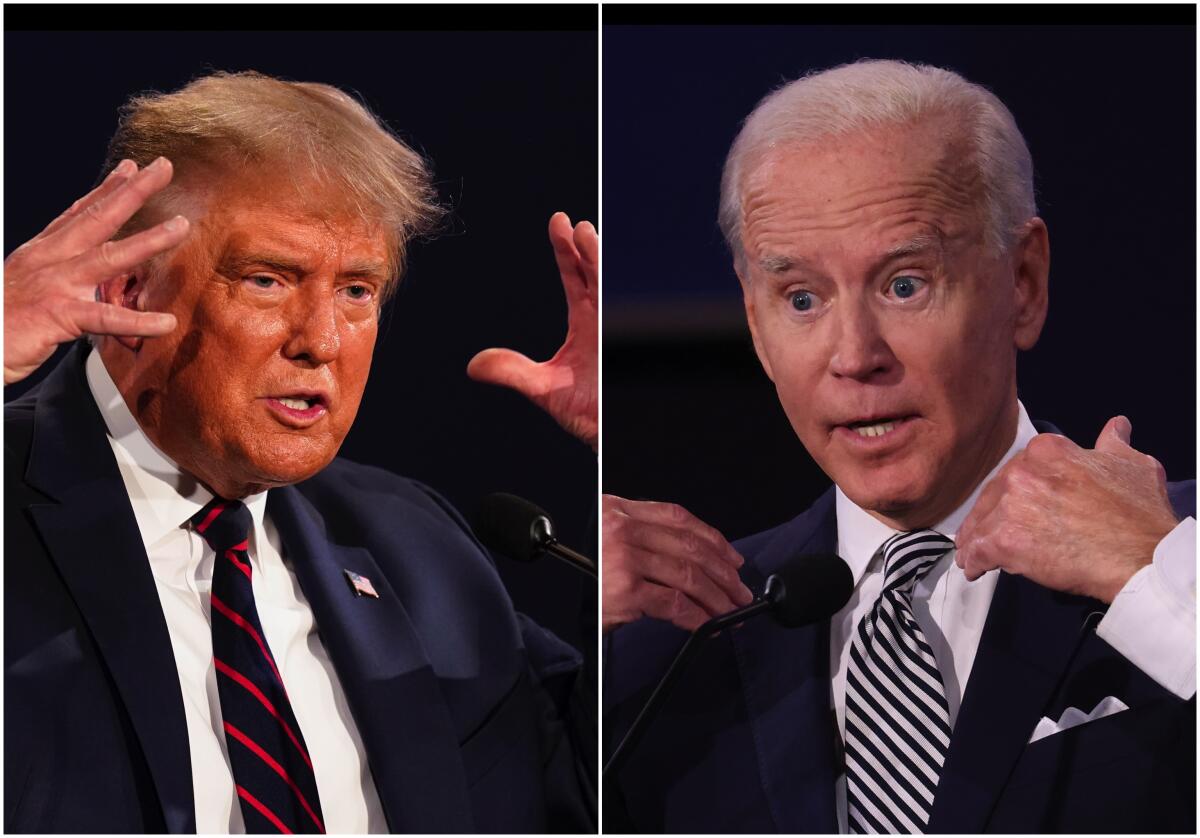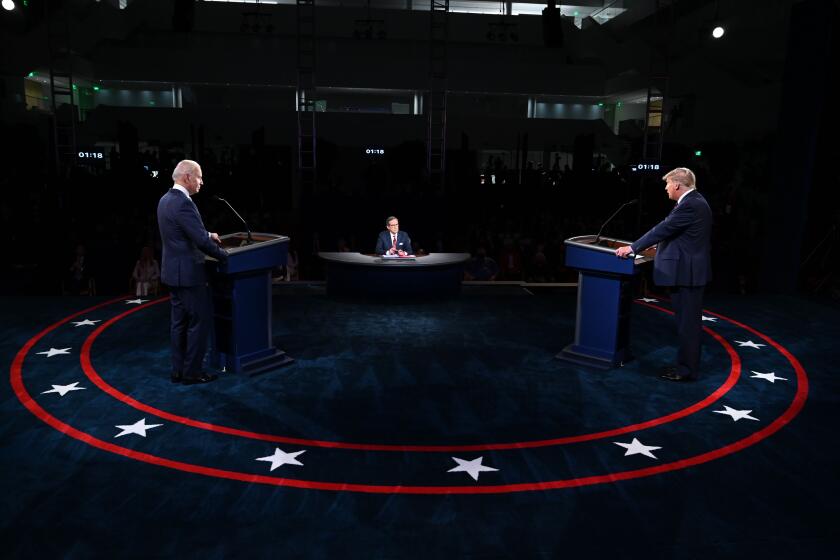Trump needed the debate to change a race he’s losing; instead, he doubled down

- Share via
WASHINGTON — President Trump has spent the last year trying to find a way to throw Joe Biden off his game and strip him of his status as front-runner in the presidential race: Tuesday night, he unloaded all his attacks at once in a remarkable display of invective and interruption.
Face to face for the first time, he took his best, most insulting shots at the former vice president.
Rather than crack, however, Biden shot back, not as forcefully as Trump, but with enough strength to rebut the overwrought caricature Trump has tried to create of the 77-year-old as a doddering, tongue-tied “Sleepy Joe.”
Trump, 74, entered the debate trailing badly behind Biden as he has for most of the year. With just over a month to go, the president needed something to happen to change the direction of the campaign. Instead, Biden may have cleared one of the biggest hurdles he will face in the homestretch of the 2020 campaign.
“The president got hurt tonight,” Republican Rick Santorum, the former Pennsylvania senator who ran against Trump in 2016, said on CNN.
Biden avoided the gaffes and stammering that can plague him — if only because Trump kept interrupting him. Rather than being at a loss for words, Biden brought to the debate a collection of one-liners and an uncharacteristic readiness to interrupt.
President Trump and Joe Biden clash Tuesday night in their first face-to-face debate
He also made effective use several times of the simple technique of staring into the camera and addressing voters at home, stressing his concern for their problems and, implicitly, drawing a contrast with Trump, who engaged in frequent quarrels with Chris Wallace of Fox News, the night’s embattled moderator.
Beyond the cross-talk and crossfire, the night’s exchanges illustrated the strengths and weaknesses of the two candidates’ campaigns.
Trump, with his loud voice and forceful presence, dominated the debate stage as he has dominated and remade American politics over the last four years. But his scattershot attacks on Biden failed to stick to any one line of argument.
The one attack Trump pursued most forcefully — that Biden is a tool of his party’s far-left — has been the hardest to persuade voters of. In pushing it, Trump gave Biden two opportunities to assert himself as the Democrats’ dominant figure.
When Trump charged, “Your party wants to go for socialist medicine.” Biden retorted: “The party is me. Right now, I am the Democratic Party.”
A little bit later, when Trump accused Biden of embracing the Green New Deal — a loosely defined set of proposals by progressives to combat climate change — Biden was able to shoot back: “I don’t support the Green New Deal,” a statement that many Democratic elected officials in Pennsylvania, Ohio and other industrial states have wanted Biden to emphasize.
Trump commented that Biden would lose the support of his party’s left, but within minutes, one of the party’s leading progressives, Rep. Alexandria Ocasio-Cortez of New York, tweeted a statement stressing her support for Biden.
For his part, Biden’s debate performance — like his campaign — was dominated by his anti-Trump message.
That approach has its downside: Any voter who wanted to know more about what Biden would do as president likely came away somewhat disappointed.
But the Biden campaign figures he will be on stronger ground framing the election as a referendum on Trump.
The president has consistently played into the Democrats’ strategy. As much as his campaign strategists would like to shift the focus to the choice between him and Biden, Trump keeps the spotlight focused on himself.
He continued to do so Tuesday night, making the debate almost entirely about him, with his domineering presence and disregard for the niceties and norms of such encounters.
Even his allies worried he went too far. “On the Trump side, it was too hot,” former New Jersey Gov. Chris Christie said on ABC.
Before the debate, Biden aides signaled that he would try to avoid taking the bait from Trump and not seek to counter every attack and falsehood.
“Joe Biden will be speaking to the folks at home,” said Symone Sanders, a Biden spokeswoman. “He’ll be speaking directly to the American people.”
The former vice president largely followed that plan, even when Trump trotted out the personal attacks that his allies had worried would provoke an emotional outburst — questions about his son, Hunter Biden.
When Trump brought up Hunter Biden’s business dealings in Ukraine, Biden parried with a reference to Trump’s own children and their vulnerability to criticism.
“His family we could talk about all night,” Biden said, speaking to the camera. “But this is not about my family or his family, it’s about your family.”
And when Trump went after the younger Biden’s history of cocaine use, Biden, again looking at the camera, said his son had struggled with drugs the way many Americans had and that he was “proud” of him for dealing with his problems.
At other points, as it became clear that Trump’s debate strategy was to badger, cross-talk and berate Biden at every turn, the Democrat dropped all pretense of civility and gave as good as he got.
He called Trump a “liar,” a “fool,” a “clown” and “unpresidential.” He chortled, smiled and laughed out loud as the president spoke.
“Will you shut up, man,” Biden snapped — a line his campaign quickly put on a T-shirt.
The imbroglio raised questions about the value of the debates for voters. But Biden’s campaign clearly felt the 90 minutes provided value to them: Officials said the campaign broke its single-hour fundraising record online as the debate closed.
Asked if Biden planned to continue participating in future debates. Biden’s deputy campaign manager, Kate Bedingfield, told reporters that they liked the contrast with Trump and are especially looking forward to the town hall format of the second debate.
“Joe Biden’s going to show up,” Bedingfield said. “He’s going to continue speaking to the American people.”
More to Read
Get the L.A. Times Politics newsletter
Deeply reported insights into legislation, politics and policy from Sacramento, Washington and beyond. In your inbox twice per week.
You may occasionally receive promotional content from the Los Angeles Times.








